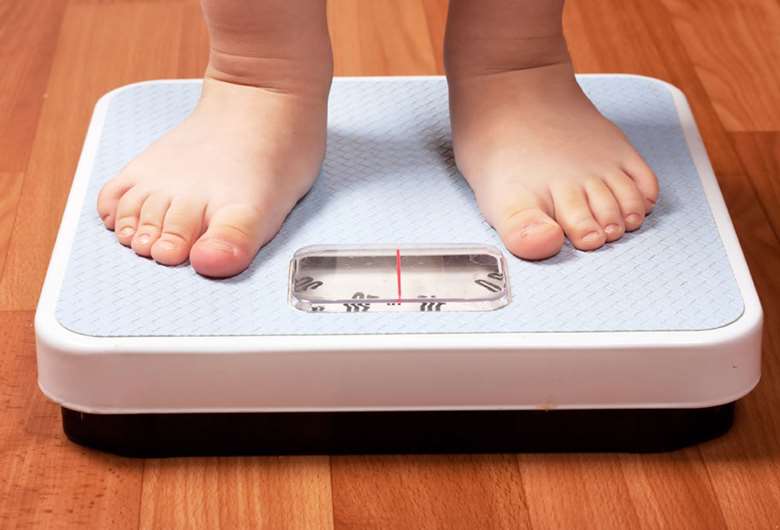England lags behind other EU countries for child health
Monday, October 15, 2018
England is falling behind other European countries in the race to improve children’s health, warns a new report that makes grim predictions for the state of children's health in 2030.

The Child Health in 2030 in England: comparisons with other wealthy countries report is published today by the Royal College of Paediatrics and Child Health (RCPCH).
- Parents fear children are exposed to junk food at school
- Guide to Childhood Obesity Strategy
- Child health and well-being in UK falling behind other OECD countries
Predictions are based on current trends, however RCPCH, which represents 18,000 paediatricians, claims things could be turned around in England if action is taken.
The report says that more needs to be done to 'avoid the danger on the horizon' and ensure children have the best start in life.
It compares data for the EU+15 – the 15 countries of the European Union in 2004 – Portugal, Luxembourg, Sweden, Greece, Belgium, Italy, Germany, Netherland, France, Finland, UK, Denmark, Spain and Ireland.
It predicts that by 2030:
- child mortality rates will be 140 per cent higher than in comparable wealthy nations in Europe
- nearly one-third of deprived boys will be obese;
- mental health problems will increase by 60 per cent
- visits by children and young people to A&E will rise by 50 per cent.
RCPCH calls on policymakers to use the opportunity of the NHS Long-Term Plan, which is due to be developed in the autumn, to improve health for children and young people. It also makes a number of other recommendations including increasing investment in the universal health visiting and school nursing services.
Backing the call is the country’s most senior paediatrician who says that a properly-funded health strategy which could transform the life chances of children and young people is ‘urgently needed’ if England is to ‘stem the predicted rises.’
Child mortality
According to the report, infant mortality in the UK has begun to rise after continuous improvement for more than 100 years.
It says that even if infant mortality begins to decline again at its previous rate, rates could be 80 per cent higher than the average across the other wealthy European countries in 2030.
If this pattern continues, the RCPCH says that rates will be 140 per cent higher in 2030.
Reasons it gives for higher infant mortality rates in the UK compared to other countries include more young mothers, and mothers that smoke during pregnancy, as well as low rates of breastfeeding.
Also, in the UK there are more cases of preventable causes of death including common infections and chronic respiratory conditions such as asthma.
It claims that poverty lies at the root of many risk factors for infant mortality as well as other major child health challenges.
Obesity
The RCPCH report quotes figures from the latest National Child Measurement Programme statistics which found that 20 per cent of 10- to 11-year-olds were obese in 2016/17.
Given this and previous data, the RCPCH estimates that there will be a gradual increase in obesity if current trends continue, but a particular steep rise for boys in deprived households. It says that by 2030, around one third of deprived boys will be obese.
The predictions do not take into account interventions announced as part of the Government’s Childhood Obesity Plan, which RCPCH says it believes contains measures that will reverse current trends.
Mental health and well-being
According to the report, mental health disorders have increased five-fold over the past 20 years and will increase a further 63 per cent by 2030 if current trends continue.
A&E visits
Currently, 5.5 million children and young people in England visit A&E, making up 26 per cent of all the total number of people, the report claims. It says the highest users are children less than a year old.
It estimates that the number of children and young people visiting A&E will increase by 50 per cent in 2030.
Professor Russell Viner, report author and president of the Royal College of Paediatrics and Child Health (RCPCH), said, ‘This report shows that England currently has poorer health outcomes than the average across the EU15+ in most areas studied, and the rate of improvement for many outcomes is lower than the EU15+.
‘This means that unless current trends improve, England is likely to fall further behind countries of similar wealth over the next decade making it harder to give children the best start in life, receive the care they need and remain healthy into productive, happy adult lives.
‘This report clearly identifies the danger on the horizon - but trends shown here are not inevitable. Each of them could be turned around if key actions are undertaken. We acknowledge that admirable action has been taken on some fronts, such as the Government’s Childhood Obesity Plan, which we believe will help to reverse current obesity trends if fully implemented. In childhood diabetes, a focused national strategy has driven major improvements in diabetes control in English children and young people.
‘However, there is more work to be done elsewhere. That’s why it’s hugely encouraging that child and maternal health have been included as a work stream in the NHS England Long-Term Plan. The forthcoming Plan provides a crucial opportunity for improving child health and my message to policy makers is to act now or the consequences are grave.’
Labour's shadow health and social care secretary Jonathan Ashworth said, 'These powerful warnings must focus the minds of ministers, who are on the verge of publishing the long term plan for the NHS. Child health outcomes in this country are scandalously poor compared with other wealthy nations, and these predictions of rising mortality, obesity and mental health problems cannot be ignored.
'We can’t carry on neglecting the heath outcomes of our children and young people. Not only is it a betrayal of the next generation, it simply stores up long term pressures for the NHS. That’s why improving the health and wellbeing of every child will be a driving mission of the next Labour government.
'The test of the upcoming plan for the NHS is to end cuts to children’s services and give child heath and well-being the priority needed.'
A Department of Health and Social Care spokesperson said, 'Improving children’s mental and physical health is a key priority for this Government and will be pivotal in our long term plan for the NHS, which we’re backing with additional funding of an extra £20.5 billion a year by 2023/24.'








